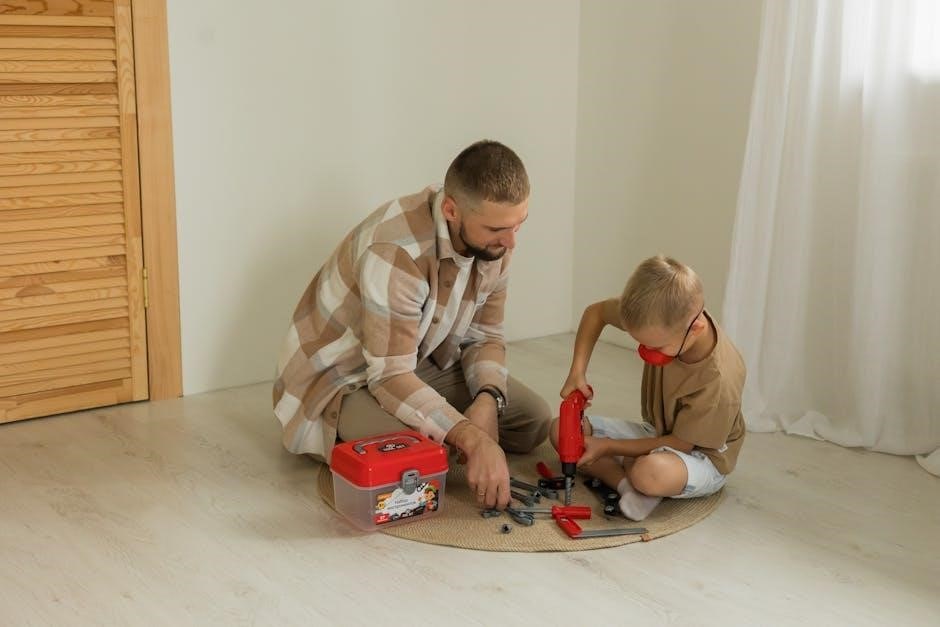The DBT PLEASE skill, part of Dialectical Behavior Therapy, helps individuals manage emotions by focusing on physical health. It encourages treating illnesses, eating healthily, avoiding drugs, sleeping well, and exercising to enhance emotional regulation and mental well-being. This approach promotes resilience and stability in daily life.

What is Dialectical Behavior Therapy (DBT)?
Dialectical Behavior Therapy (DBT) is a psychotherapy approach developed by Marsha Linehan to help individuals manage intense emotions, reduce self-destructive behaviors, and improve interpersonal relationships. It combines principles from cognitive-behavioral therapy (CBT) with mindfulness and acceptance strategies. DBT focuses on four core modules: Mindfulness, Distress Tolerance, Emotion Regulation, and Interpersonal Effectiveness. These modules provide practical skills to regulate emotions, tolerate distress, and communicate effectively. DBT is particularly effective for individuals with borderline personality disorder but is also used to address other mental health challenges, such as depression, anxiety, and substance use disorders. The therapy emphasizes balancing acceptance of the present moment with efforts to change harmful patterns of behavior. By teaching individuals to manage emotions and reduce impulsivity, DBT promotes long-term emotional stability and well-being. Its structured approach makes it accessible and actionable, helping people lead more fulfilling lives. DBT has gained widespread recognition for its effectiveness in addressing complex emotional issues and is now widely used in clinical settings worldwide.

Understanding the PLEASE Skill in DBT
The PLEASE skill in DBT is a practical tool designed to help individuals maintain emotional stability by addressing basic physical needs. It serves as a reminder to prioritize self-care and healthy habits, which are essential for managing intense emotions and reducing vulnerability to emotional dysregulation. The acronym PLEASE stands for five key components: Treat Physical Illness, Eat Healthy, Avoid Mood-Altering Drugs, Sleep Well, and Exercise. By focusing on these areas, individuals can create a foundation of physical well-being that supports emotional resilience. Neglecting physical health often exacerbates emotional struggles, making it harder to cope with stress or difficult situations. The PLEASE skill encourages individuals to take proactive steps to care for their bodies, which in turn strengthens their ability to regulate emotions and respond to challenges more effectively. This skill is particularly useful for those who struggle with intense emotions or impulsive behaviors, as it provides a clear and actionable guide for improving overall well-being. By integrating the PLEASE skill into daily life, individuals can reduce emotional vulnerability and enhance their quality of life.

Components of the PLEASE Skill
The PLEASE skill consists of five interconnected components: treating physical illness, eating healthy, avoiding mood-altering drugs, sleeping well, and exercising. These elements work together to enhance physical and emotional well-being, reducing vulnerability to intense emotions and improving overall resilience and stability.
4.1. Treat Physical Illness
Treating physical illness is the first component of the PLEASE skill in DBT, emphasizing the importance of addressing physical health to maintain emotional stability. Neglecting physical health can lead to increased emotional vulnerability, making it harder to cope with stress or intense emotions. By prioritizing medical care, individuals can reduce physical discomfort that may exacerbate emotional reactivity. This includes seeking professional help for chronic or acute conditions, adhering to prescribed treatments, and managing pain effectively. Ignoring physical health can lead to a cycle of worsening symptoms, both physically and emotionally, which may result in impulsive behaviors or mood swings. DBT encourages individuals to take an active role in their health, recognizing the strong connection between the body and mind; Regular check-ups, following medication regimens, and addressing any health concerns promptly are key to this component. By taking care of physical health, individuals create a foundation for better emotional regulation and overall well-being. This step is essential for building resilience and reducing the likelihood of emotional crises. Treating physical illness is not just about addressing symptoms but also about fostering a healthier, more balanced life.
4.2. Eat Healthy
Eating a healthy, balanced diet is a cornerstone of the PLEASE skill in DBT, as it directly impacts both physical and mental well-being. A nutritious diet provides the body with the necessary energy and nutrients to function optimally, which in turn supports emotional stability. Research shows that poor eating habits can lead to increased emotional vulnerability, making it harder to manage stress and regulate emotions effectively. DBT emphasizes the importance of avoiding extreme or restrictive diets, instead advocating for a balanced approach that includes a variety of whole foods, fruits, vegetables, lean proteins, and whole grains. Regular meal times and avoiding excessive sugar or caffeine can help stabilize mood swings and prevent energy crashes. By prioritizing healthy eating, individuals can reduce emotional reactivity and improve their overall quality of life. This component of the PLEASE skill encourages individuals to develop a positive relationship with food, focusing on nourishment rather than restriction or indulgence. Healthy eating habits lay the groundwork for better emotional regulation and a more balanced lifestyle, making it easier to handle life’s challenges with resilience and clarity.

4.3. Avoid Mood-Altering Drugs
Avoiding mood-altering drugs is a critical component of the PLEASE skill in DBT, as substances like alcohol, recreational drugs, and even certain medications can significantly impact emotional regulation and mental health. These substances often interfere with the brain’s ability to manage emotions effectively, leading to heightened emotional reactivity and impulsivity. By avoiding mood-altering drugs, individuals can maintain clearer thinking and better control over their emotions, which is essential for practicing other DBT skills. Drugs can also worsen physical health, creating a cycle of vulnerability that makes it harder to cope with stress or difficult situations. DBT encourages individuals to focus on healthy, natural ways to regulate their emotions rather than relying on substances. This component of the PLEASE skill promotes long-term mental and physical well-being by reducing dependence on external substances and fostering self-awareness and resilience. By avoiding mood-altering drugs, individuals can build a stronger foundation for managing their emotions and improving their overall quality of life.
4.4. Sleep Well

Sleeping well is a vital part of the PLEASE skill in DBT, as it directly impacts both mental and physical health. Adequate sleep helps regulate emotions, reduce stress, and improve overall well-being. Lack of sleep can lead to increased emotional vulnerability, making it harder to manage difficult feelings and behaviors. DBT emphasizes the importance of establishing a consistent sleep routine to promote better rest and recovery. This includes creating a calming bedtime environment, avoiding stimulants like caffeine or electronics before bed, and setting realistic goals for sleep duration. By prioritizing sleep, individuals can enhance their ability to cope with emotional challenges and maintain a stable mental state. Sleep plays a crucial role in supporting the other components of the PLEASE skill, ensuring that the body and mind are well-equipped to handle daily stressors. Improving sleep hygiene is a practical step toward achieving emotional balance and long-term health.
4.5. Exercise
Exercise is a key component of the PLEASE skill in DBT, playing a crucial role in improving both physical and mental health. Regular physical activity helps reduce emotional vulnerability, alleviate stress, and enhance overall well-being. By incorporating exercise into daily routines, individuals can better manage intense emotions and reduce the likelihood of impulsive behaviors. Even 20-30 minutes of brisk walking, yoga, or other moderate exercises can have a positive impact. Exercise releases endorphins, which naturally boost mood and reduce symptoms of anxiety and depression. It also provides a healthy outlet for emotional expression and can serve as a distraction from distressing thoughts. DBT encourages individuals to explore various forms of exercise, such as stretching, bodyweight training, or Pilates, to find activities that bring joy and fulfillment. Consistency is key, as regular exercise fosters resilience and supports long-term emotional stability. By prioritizing physical activity, individuals can strengthen their ability to cope with challenges and maintain a balanced lifestyle. Exercise is not just about physical health; it is a powerful tool for emotional regulation and well-being in DBT.

How to Implement PLEASE Skills in Daily Life
Implementing PLEASE skills involves setting realistic goals, creating a daily routine, and tracking progress. Start by identifying small, achievable steps to improve physical health, such as scheduling meals or exercise. Use a journal or app to monitor adherence and celebrate successes. Consistency is key to building resilience and emotional stability.

5.1. Setting Realistic Goals
Setting realistic goals is the foundation of successfully implementing the PLEASE skills. Start by assessing your current habits and identifying areas for improvement. For example, if you struggle with healthy eating, aim to incorporate one balanced meal daily instead of overhauling your entire diet. Break larger goals into smaller, manageable steps to avoid feeling overwhelmed. Specific, measurable objectives, such as walking for 20 minutes each morning, are more attainable than vague resolutions. Consider your lifestyle and constraints to ensure your goals are achievable. Celebrate each milestone to maintain motivation. Setting realistic goals fosters a sense of accomplishment and reinforces positive behaviors, making it easier to sustain long-term changes. This approach aligns with the DBT principle of radical acceptance, helping you work within your capabilities while striving for improvement. By focusing on incremental progress, you build resilience and lay a strong foundation for overall well-being.
5.2. Creating a Daily Routine
Creating a daily routine is essential for consistently practicing the PLEASE skills. Start by identifying the key activities that align with each component of the PLEASE acronym and schedule them into your day. For example, dedicate time for healthy meals, regular sleep hours, and physical exercise. Consistency is crucial, as it helps build habits that support emotional and physical well-being. Begin by listing all daily tasks and prioritizing those that directly contribute to your health, such as medication adherence, balanced eating, and stress-reducing activities like walking or yoga.
Assign realistic time slots for each activity, ensuring they fit naturally into your lifestyle; Incorporate reminders or alarms to stay on track, especially for habits like taking medication or hydrating. Additionally, include moments for relaxation and self-care, such as reading or meditating, to balance productivity and rest. Flexibility is important; life can be unpredictable, so adapt your routine as needed while maintaining core health-promoting practices. Tracking your progress daily can reinforce commitment and highlight areas for improvement. By structuring your day around the PLEASE skills, you create a framework that supports long-term emotional resilience and physical health.
5.3. Tracking Progress
Tracking progress is a vital step in integrating the PLEASE skills into your daily life. By monitoring your adherence to each component, you can identify patterns, celebrate successes, and address areas needing improvement. Start by keeping a daily journal or using a mobile app to log activities like meals, sleep hours, exercise, and medication use. This record will help you stay accountable and motivated.
Include specific details such as the quality of sleep, the balance of your diet, and the intensity of your workouts. For example, note if you avoided mood-altering substances or treated physical illnesses promptly; Regularly reviewing your entries can reveal trends, such as improved energy levels or reduced emotional reactivity, reinforcing the benefits of the PLEASE skills.
Set aside time each week to evaluate your progress. Ask yourself if you consistently met your goals or if certain challenges arose. Use this reflection to adjust your routine or seek additional support when needed. Tracking not only enhances accountability but also builds self-awareness, empowering you to make informed decisions that promote long-term well-being. Over time, this practice will become a cornerstone of your emotional and physical health management.

Benefits of Practicing PLEASE Skills
Practicing PLEASE skills enhances emotional regulation, improves mental health, and promotes physical well-being. By addressing physical needs, individuals reduce emotional vulnerability, leading to better stability and resilience in managing stress and challenging situations. Regular practice fosters a balanced lifestyle, supporting overall health and emotional harmony.
6.1. Enhanced Emotional Regulation
Practicing the PLEASE skills significantly improves emotional regulation by addressing the interconnectedness of physical and mental health. By treating physical illnesses, maintaining a healthy diet, avoiding mood-altering substances, ensuring adequate sleep, and engaging in regular exercise, individuals create a strong foundation for emotional stability. These practices reduce vulnerability to intense emotions and help manage stress more effectively. For instance, proper sleep hygiene and balanced eating habits prevent mood swings, while exercise releases endorphins that uplift mood and reduce anxiety. Avoiding drugs and alcohol minimizes emotional reactivity, allowing for clearer thinking and better decision-making. Over time, these habits foster resilience, enabling individuals to handle life challenges without becoming overwhelmed. Enhanced emotional regulation leads to greater control over emotions, reducing impulsivity and improving overall mental well-being. By prioritizing physical health, individuals empower themselves to navigate emotional difficulties with greater ease and balance. This skill is particularly beneficial for those struggling with intense emotions, as it provides practical tools to manage and regulate their emotional responses effectively. Consistent practice of PLEASE skills creates a lifestyle that supports long-term emotional and mental health.
6.2. Improved Mental Health
The DBT PLEASE skills play a crucial role in enhancing mental health by addressing the interconnectedness of physical and emotional well-being. By focusing on treating physical illnesses, eating a balanced diet, avoiding mood-altering substances, sleeping well, and exercising regularly, individuals create a strong foundation for mental health. These practices help reduce symptoms of anxiety, depression, and other mental health challenges by stabilizing emotions and improving resilience. For instance, proper nutrition and regular exercise boost serotonin levels, which can alleviate depressive symptoms. Avoiding drugs and alcohol prevents exacerbation of mental health issues and supports clearer thinking. Adequate sleep enhances emotional regulation, reducing irritability and stress. Over time, these habits promote a sense of control and confidence, fostering a healthier mental state. The PLEASE skills empower individuals to manage daily stressors more effectively, leading to improved overall mental well-being. By prioritizing physical health, individuals can address mental health challenges more successfully, creating a balanced and sustainable approach to emotional and psychological stability. This skill set is particularly beneficial for those struggling with intense emotions or mental health disorders, as it provides practical tools to enhance mental clarity and resilience.
6.3. Better Physical Health
Practicing the DBT PLEASE skills significantly contributes to better physical health, creating a positive cycle that benefits both the body and mind. By treating physical illnesses promptly, individuals avoid complications that can worsen mental health. Eating a healthy, balanced diet provides the necessary nutrients for optimal bodily functions, boosting energy levels and overall vitality. Avoiding mood-altering drugs reduces the risk of dependency and physical harm, promoting a cleaner and healthier lifestyle. Prioritizing sleep ensures the body gets the rest it needs to repair and rejuvenate, essential for immune function and physical resilience. Regular exercise strengthens the cardiovascular system, improves muscle tone, and enhances flexibility, all of which contribute to long-term physical well-being. Together, these habits foster a strong and healthy body, which in turn supports mental health and emotional stability. By integrating the PLEASE skills into daily life, individuals can achieve a balanced and thriving physical state, empowering them to handle life’s challenges with greater strength and resilience. This holistic approach to health emphasizes the importance of caring for the body as a foundational step toward overall wellness.

Resources and PDF Guides for DBT PLEASE Skills
Access official DBT PLEASE skills guides, including PDFs like DBT Skills Training Handouts and Worksheets by Marsha Linehan. Find resources like printable posters, trackers, and workbooks online or through therapy platforms to master the PLEASE skills effectively.
7.1. Finding DBT PLEASE PDFs
Finding DBT PLEASE skills PDFs is straightforward, with numerous resources available online; Official guides like DBT Skills Training Handouts and Worksheets by Marsha Linehan are widely accessible. Many therapy platforms offer free or purchasable PDFs, including posters, trackers, and detailed workbooks. Additionally, websites like TherapistAid and DBT Tools provide downloadable materials specifically designed for mastering the PLEASE skills. These resources often include worksheets, exercises, and step-by-step guides to help individuals implement the skills effectively. For those seeking structured learning, PDFs from DBT Skills Training Manual are highly recommended. Ensure you access these materials from reputable sources to guarantee accuracy and quality. These PDFs are invaluable for individuals and therapists aiming to integrate DBT PLEASE skills into daily practice.
7.2. Recommended DBT Workbooks
Several workbooks are highly recommended for mastering DBT PLEASE skills, offering structured guidance and practical exercises. Marsha Linehan’s DBT Skills Training Manual is a cornerstone, providing comprehensive insights and worksheets tailored for emotion regulation. Another excellent resource is DBT Skills Training Handouts and Worksheets, Second Edition, which includes detailed sections on the PLEASE skill, enabling users to track progress effectively. For those seeking interactive learning, The Dialectical Behavior Therapy Skills Workbook by Matthew McKay offers accessible exercises and real-life applications. These workbooks are available in PDF formats, making them easily accessible for digital use. They are ideal for both individuals and therapists, offering clear instructions and tools to implement DBT techniques. By utilizing these resources, users can deepen their understanding of the PLEASE skill and its role in enhancing mental and physical well-being. These workbooks are essential for anyone aiming to integrate DBT practices into their daily routine.
